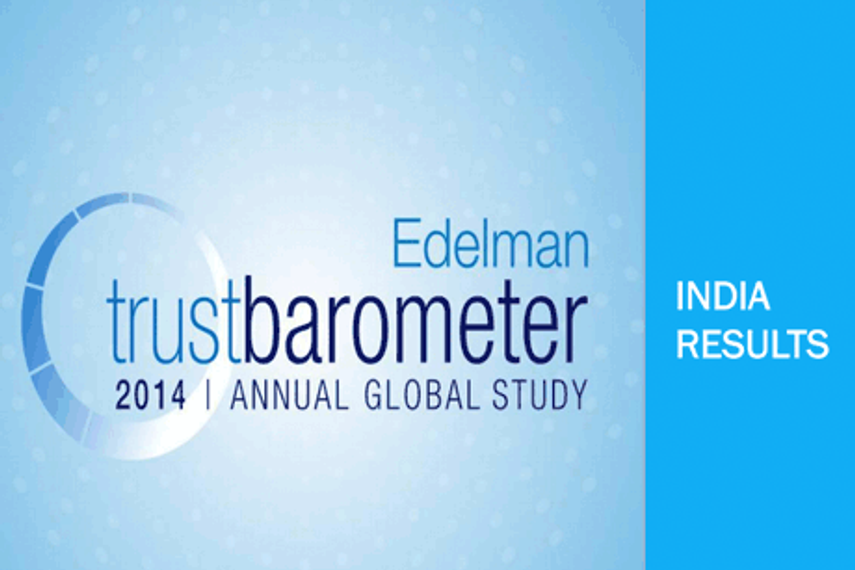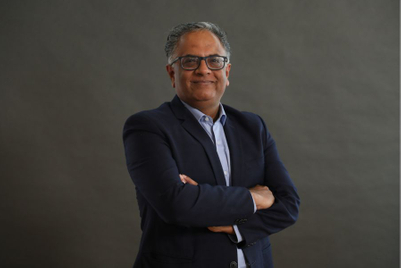
NGOs emerged the most trusted of institutions among ‘informed publics’, according to the 2014 Edelman Trust Barometer - the firm’s annual trust and credibility survey across 27 countries. The 14th edition of the Barometer was launched at Davos on 22 January by Richard Edelman, president and CEO, Edelman.
In the survey, which captures trust levels in four key institutions (Government, Business, Media and Civil Society (NGOs)), NGOs emerged the most trusted in 20 of 27 markets. NGOs were the only institution to record a rise in trust levels in the 2014 edition globally.
The global sample for the survey is 33,000. In India, the sample was 1200, including 200 informed publics – defined by education, media consumption, income, engagement in business news and public policy.
In India too, NGOs were the only institution to record a rise in trust levels among informed publics. However, despite a drop in trust levels, Business was the most trusted institution in India. Media registered a steep drop, according to the survey. Within media, there were some interesting revelations among internet-using ‘informed publics’.
Campaign India caught up with Rakesh Thukral, COO, Edelman India about the nuances of the findings.
How do you view the results in India compared to other countries?
It's very interesting that India remains a very trusting nation, as compared to globally. Russia is at 37 per cent, South Africa is 50 per cent, Brazil is 57 per cent, US and France are at 49 and 46 per cent respectively (chart above). Though India was at number three last year, this year, India is number five. It has slipped, we feel because people in UAE, Indonesia, Singapore, China markets have more certainty about economic activity and situation in the country and how the income levels are going up in these countries.
Globally, Business emerges as the number two institution. Whereas, NGOs are number one. In India, Business is number one and NGO is number two, when it comes to trusting an institution. Media is the third institution, and it keeps going up and down in the Trust Barometer. The fourth one is Government. The trust in NGOs started going up sometime in 2011-‘12, when the whole Anna Hazare movement happened, followed by women safety issues in the wake of the Nirbhaya case.
People are putting up their expectation in Business the most, perhaps because people are getting engaged with business community and that's where the assurance of employability and means to livelihood also come to play. They are trusting the businesses to keep their employability and livelihood going. While in India, businesses are trusted, Indian businesses abroad are not trusted that much. When we asked people if they would like Indian companies to buy out companies in their country or if you would want Indian investment in your country, the answer is not that encouraging as we would welcome FDI into India.
Indian businesses have to build their trust, imagery, and brand outside India. How it also reflects the businesses is how they can be more responsive, more engaging with the customers, and sensitive to consumer interest.
The study says that the trust in Government has plummeted, but that in government official or regulator has increased by 11 per cent. Doesn’t it paint a dichotomous picture?
Government remains static and has come down to 53 per cent. When we asked people if they trust the business community, such as CEOs, to tell the truth, and do the right thing, the trust levels plummet. The trust in Government is really low. Only 25 per cent people trust government officials (to do the right things).
When you look at trust in regulators, in the last year and so, it has really gone up. It saw a big jump of 11 per cent last year. Perhaps Government is seen in two to three shades – it could be an electoral representative, the officials, and the government could be seen as regulator. Regulators are seen as the most trusted part of government.
Trust in traditional media is more in India, when compared to other countries...
Trust in traditional media in India remains high. India is one of the rare markets, where traditional media may not be in best of the health but continues to grow. It has to do with two key factors - literacy levels are going up and income levels are rising. Moreover, the 'informed publics' in India prefer online search engines for credible news and information. People check and validate the data for themselves. While there is no getting away from traditional media, this could be the beginning of a turning point, where traditional media needs to start thinking about protecting its leadership and also from PR point-of-view, the focus from traditional media isn't away yet. Indian companies and stakeholders continue to need to work on traditional media as they start to focus on social media now.
According to the study, trust in Government in India remains low when compared to other countries. Would the forthcoming Lok Sabha elections turn the tide?
It's not about Lok Sabha elections. It is about what the government performs and delivers. If you look at NGOs and Business, they are seen as efficient institutions as you get the delivery of what you want. NGOs have taken up the burning issues in the country. They have delivered on the role of the watchdog.
Any important takeaways that you wish to highlight?
If you look at individual category of people who are trusted the most – it is the academics and experts. Companies and institutions need to take a note of it. Trust is in direct proportion to how these institutions deliver. NGOs have a high level of trust. Media has enjoyed high level of trust when they have highlighted issues of the public. There has been a slippage now, and media needs to see why it has happened. Trust is fragile, it keeps fluctuating. From a business point of view, high level of trust also increases the level of expectations. Those expectations need to be understood, comprehended, and responded to. We have to keep a keen eye on the environment, and accordingly engage with consumer. People have developed an indifferent attitude to the government, and they do not have expectations from the government. But they have expectations from business.









.jpg&h=334&w=500&q=100&v=20250320&c=1)
.jpg&h=334&w=500&q=100&v=20250320&c=1)


.jpg&h=334&w=500&q=100&v=20250320&c=1)

.jpg&h=334&w=500&q=100&v=20250320&c=1)

.jpg&h=334&w=500&q=100&v=20250320&c=1)









